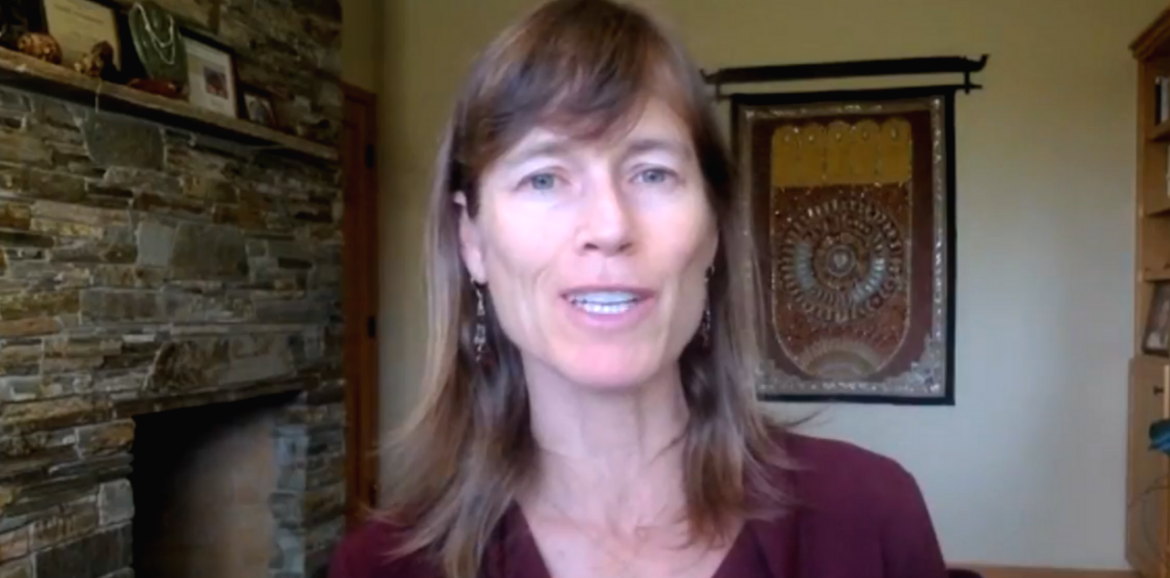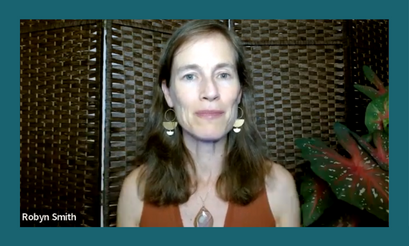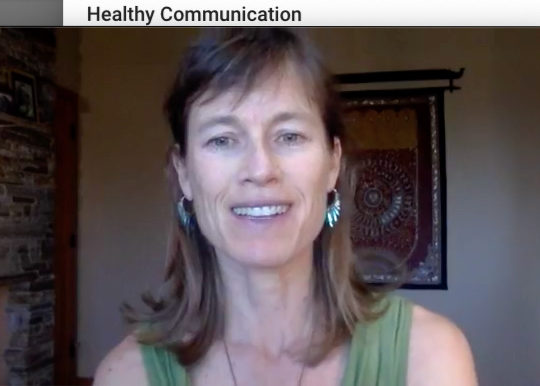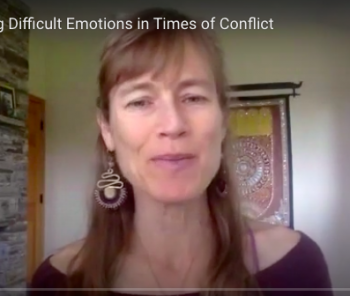Why do we get defensive, what does it look like, and what can we do about it?
Why do we get defensive?
Defensiveness is a protective mechanism. It's a way that you protect your sense of self and how people see you; also known as your ego, how you are perceived by others, and your personality. You are protecting that view that others have of you. If you get some kind of negative feedback, negative information about yourself, you're going to try and protect that. And you do that, usually, by getting defensive.
I also think of defensiveness as a way of preventing ourselves from feeling difficult feelings and emotions. If we don't want to feel the pain of sadness, or anger or loss, or fear, then we might show a more defensive side of ourselves. It’s self-protection.
What does it look like?
So, how do you know when you're getting defensive? What does it look like? What does it feel like? What are your own signs of defensiveness? Because
there's lots of styles of defensiveness. And you may have your favorite style.
I'll be naming a few of these.
• Your voice is raised
• You have a stronger tone or a pushing quality to your voice.
• You may have some hand gestures that are stronger than your normal kind of gesture.
• You may sound argumentative.
Other signs of defensiveness are: you close your posture, you put your hands on your hips, you fold your arms, maybe you pull back, or maybe you go forward. Tune into what's true for you about how you show up defensively.
Another sign might be you're not really able to listen to the other person, because you're interrupting, you are trying to get your perspective in. You don't really want to hear what they have to say, and you want to make sure they hear what you have to say. So, you're in rebuttal mode.
Different Types of Defensiveness
Let's talk about these different types of defensiveness now.
Making excuses. An example would be, "I couldn't get there on time because my kids started acting up, and then my car wouldn't start and ...". You may have a list of reasons. Excuses for why you couldn't do something or were acting the way you were acting.
Maybe you're justifying what you said or did. You might be justifying who you are with phrases like, "well, it's just because I'm...", or "I was tired" or "because...". They're all similar in justifying or validating why you did what you did so the other person can understand.
Another thing you might be doing is blaming the other person. Ex: "well, you are late too", or "if you wouldn't have said it that way", or, "why don't you do it too?", "if you would do it, I would do it". So, it's s like a push back.
Another thing you might be doing is judging the way the message was delivered. If somebody says something you don't like you might say, "your tone is too strong for me" or, "I don't like how you're looking at me right now". So that is a type of defensiveness.
One more thing is explaining. Explaining is when you give this laundry list of what went on and your whole experience around it, instead of "so what's the alternative"?
You’re Not Alone
I want to say that I don't know anyone who doesn't get defensive. It's really kind of an impulsive response that we all do. It’s a form of self-protection and it's really normal. What I'd love for you to do is give yourself some compassion. Give yourself a break if you find yourself getting defensive. It's uncomfortable, something's coming at you, and your actions are trying to protect you. And that's the natural response to it. We have to train ourselves not to be defensive, because is our kind of "go to" response.
So, let's move on to why it might be a problem to be defensive. If it's so natural, why is it a problem? Well, the problem with defensiveness is that it's not very pleasant to receive defensiveness. My experience of it is, it does feel like a wall is getting put up, and I feel shut out. If you want to make a connection with someone and they're getting defensive, there's not a lot of ability to connect, because it's like they're pushing you away.
There are so many types of defensiveness. You may react one way to one type, and another to another type. It is like a pushback. The main thing I noticed is that it's very hard to feel close, to feel connected. So, if you're wanting closeness in a relationship, if you're wanting intimacy, if you're wanting some kind of connection, if you're wanting to be understood and heard, usually someone's not able to do that when they're defensive.
Fight, Flight and Survival
Usually when a person is defending, they probably have a lot of adrenaline going through the system. Adrenaline's the stress hormone that comes up short notice and it's for protection. It's that fight or flight hormone. So, they're probably in that fight mode, or some version of that fight or flight when they're in defensiveness.
Adrenaline affects your brain in such a way that it puts you into protection mode and then it makes you really focused on survival and you're not really able to make a connection. Because your brain's not getting that kind of availability. It's like it shuts off that connection part of your wiring and your nervous system and it's focusing on protection. We can't do both at the same time.
Sometimes you want to defend, you don't want to connect, you want to shut somebody out. They're not someone you like or know or want to like or get closer to. And that's fine. There are times when we need to defend ourselves. Absolutely. But often we find ourselves defending against the people we love and really desire connection with and that's when it's a bummer.
When we're in our reaction brain (fight or flight) and we're in our survival brain (the amygdala is the part of the brain that's responsible for that), fear kind of governs fear. So, your brain is responding from the reptilian (oldest) part of the brain. Reptiles don't do a lot of connection, warmth and hugging. And they're all about just eating and surviving. We humans are more evolved, but we still have that lower brain, we still have that reptilian side of our brain. We can easily go there when we feel unsafe. That would be another reason you might get defensive; you don't feel safe.
Making the Shift
To shift defensiveness, there's many things you can do. But first, you want to notice you're getting defensive. So, some signs are: your heart is pounding, maybe your voice got louder, maybe you've got a more intense tone, maybe you're gesturing more, maybe you feel like you're in an argument, but you're not meaning to be. So those are some signs that you want to notice and just take a note for yourself and pause. Take a breath and give a little space to the communication. You can choose to shift out of the pattern.
Instead of talking, which sometimes might look like interrupting, just button your lip and listen. Practice listening. This person is giving you information about their experience, about their concerns, about something they noticed, they're wanting you to hear them or they wouldn't be telling you. So, it's an opportunity to practice really listening and noticing your response.
Noticing your physical response. Maybe you're noticing your heart pounding, your hands are sweating, your jaws clenching, whatever you're noticing, and let yourself be with that. Ask yourself, "Am I safe right now?", "Is this person threatening me?", and if none of those things are happening, if you're safe and you're not under a real attack, then you really can take a moment to shift and pause and be okay. You can assure yourself, "I'm okay".
There are many moves that I've taught in my groups about how to soothe your nervous system, and I'm just going to give you one right now. Remember, when you're in your reptilian brain, it's hard to listen. It's pretty hard to make a connection. So, you can make a move with your body.
Let's do a simple one. it could look like a hug. Put one of your hands right under the armpit on the opposite side and the other hand around its opposite shoulder. And if you give yourself a little squeeze, it's like you're getting a hug. And it's actually quite soothing for your nervous system. Take a moment with that. Let yourself breathe. Then you might be able to listen better. And you might be able to respond from a better place, instead of defending and putting up a wall.
So, taking a breath, pausing, and doing something to sooth your nervous system. And then, practice listening, opening your ears, remembering that they're wanting to communicate something with you.
Another thing I want to share that I think is really key to counteract defensiveness is taking
responsibility
for your part. Really, it's like receiving what you're being told. And doing your best to agree to the parts you could agree to, with something like, "Hey, I'm hearing you" or "You're right, I did that", or, "Gosh, I didn't mean to do that. I apologize". Really let them know you heard what they said and you're aware of it. And you want to change it, if you do, if that's honest. So those types of things, taking responsibility or ownership for your part of what's happening and letting them know you've heard them is going to go a long way towards shifting out of the pattern and making a connection. Because if someone's communicating with you, they want to be heard.
Be Gentle with Yourself
You may have a lot of self-judgment about getting defensive and creating arguments. And defensiveness really can create arguments, especially if both people are doing it. So again, be gentle and compassionate with yourself. If that's your habit, you've probably learned it from somewhere. Maybe you needed to defend yourself a lot when you were little.
If you had a reason to protect yourself as a child, defensiveness is one way you may have done that. And, you may still be doing that, and you may still be surrounding yourself with people who you find unsafe, or you find are attacking you or judging you. And we tend to repeat patterns from our childhood, right?
So, if that was something that was happening earlier in your life, it may still be happening. And you may still find yourself in that similar response of feeling like you have to defend yourself. So again, some self-compassion and some willingness to change. That starts with this awareness of, "how am I getting defensive?", "what does that look like on me?", "what am I doing to contribute to this dynamic right now?"
Final Thoughts
It’s good to get curious. How to shift this dynamic is by taking a breath and getting curious about what this person is trying to communicate and what do they want right now? What are they wanting you to understand? And, also doing any kind of move you can do for yourself to soothe yourself so you can listen and get yourself out of that fight flight mode, and then taking responsibility/ownership for your part.
Again, if you do choose to study with me more, I will share more. There's a lot more to this, but I wanted to give you something simple that you can implement right away. So, I hope you do. And please let me know if this has been helpful and/or if you have any questions. I would love to know.
Please tell a friend if you found this helpful. Tell your friends to find us in the Healthy Relationships Sisterhood Facebook group or to find me on Instagram @robyn.smith.relationshipcoach. You could send them to my website at consciousthrivingrelationships.com and they can hook up with me that way as well. I look forward to seeing you soon. Bye for now.
Join my Facebook group, the Healthy Relationships Sisterhood for free weekly trainings here: https://www.facebook.com/groups/consciousthrivingrelationships







